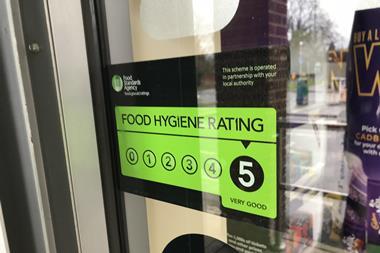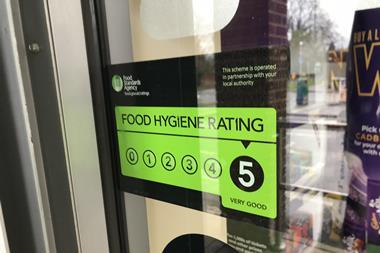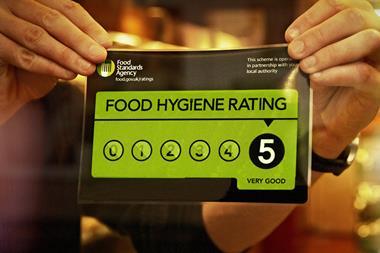The Food Standards Agency (FSA) has put a three-year time frame on making the display of Food Hygiene Rating Scheme (FHRS) scores mandatory in England.
Nina Purcell, the FSA director leading the Regulating our Future overhaul of food hygiene rules announced earlier this year, told C-Store she thought the early part of 2019 was realistic, although “we may get it sooner”, she said.
This would bring England into line with Wales where the FHRS has been mandatory since 2013 and in Northern Ireland – since October 7 this year. Scotland has its own scheme, The Food Hygiene Information Scheme, which Food Standards Scotland hopes to make mandatory.
The FSA expects to have given its evidence to ministers by the end of the year for making display of the FHRS scores mandatory, but Purcell said there would be “a lot of demand on parliamentary time”.
“The FHRS is really good because it’s an example of consumer power. Consumers understand it and use it which leverages the behaviour of businesses,” she said.
Purcell said there would need to be a hefty penalty for a mandatory scheme to have credibility. “Regulation needs to be clear and robust to give it the teeth to [show we] really mean it.”
Purcell spoke to C-Store the week after a speech given by FSA chairman Heather Hancock at a parliamentary reception sponsored by MPs Angela Smith and Michael Fabricant, in which she cited evidence that “driving up standards through mandatory display improves public health”.
When the FSA had ministerial approval, it would fold it into those wider regulatory reforms, making sure the FHRS was “properly financed” and has the capacity to meet demand, Hancock said.
It is understood this could see businesses charged in some way as part of the inspection regime although nothing has yet been decided and the FSA is consulting with interested parties.
The Association of Convenience Stores has already voiced its objection to retailers being “burdened by additional rating reassessment costs”.
Meanwhile, Purcell has denied reports that big supermarket chains, such as Tesco, will be allowed to police themselves.
She said all that had been mooted was using other sources as part of the inspection regime, such as data from third-party specialists the businesses used, to give an more comprehensive picture than a purely visual inspection.
“It’s about taking a more holistic view and getting assurances in different ways,” she said.























No comments yet